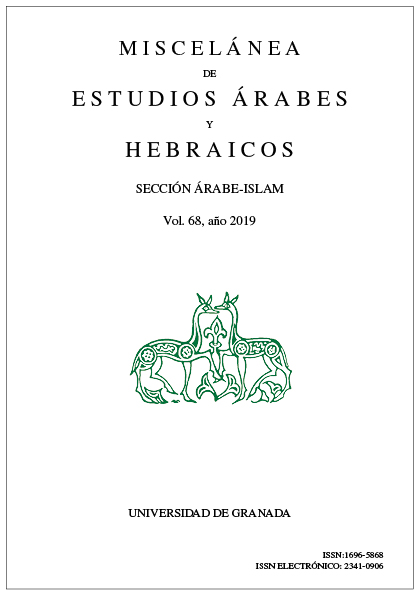Zawāl al-taraḥ: A commentary about the poem by Ibn Faraḥ al-Ishbīlī (m. 699/1300) in a 19th century Ethiopian manuscript
DOI:
https://doi.org/10.30827/meaharabe.v68i0.1008Keywords:
Sufī poem on ḥadīṯ, Al-Andalus in Eastern Africa, Islam in EthiopiaAbstract
There are myriad examples of how Andalusī intellectual production spread through space and time thanks to commentaries that other ʻulamā’ wrote about works ori- ginating in the Iberian Peninsula. This paper looks at one such example. The paper analyz- es the way in which Ibn Faraḥ/Farḥ’s poem on ʻilm al-ḥadīṯ came to be known to Ethiopi- an ʻulamā’ of the modern era (early 19th century, in this case), given that their textual tradi- tion —produced in Arabic— has only recently begun to be studied. To do so, this contribu- tion studies the edition of the Zawāl al-taraḥ, the commentary on Ibn Faraḥ/Farḥ’s text made by Ibn Jamāʻa, which was copied in a manuscript produced and preserved in Ethio- pia. In this copy, however, the commentary is wrongly attributed to an Ethiopian scholar. After comparing this version with the extant editions of other versions of the Zawāl and examining the variations between them, it has been confirmed that the text is the same as Ibn Jamāʻa’s text. Attempts are made to discover the causes of the mistaken attribution. Finally, the paper analyzes the reasons that led the ʻulamā’ of certain Sufi circles to include the Zawāl al-taraḥ in their recommended readings.
Downloads
Downloads
Additional Files
Published
How to Cite
Issue
Section
License
The authors publishing their work in this journal agree to the following terms and conditions:
1. The authors retain the copyright and give the journal the right to be the first publication of the work and also to be licensee under a Creative Commons Attribution License which allows others to share the work, provided the author of the work and the initial publication in this journal are acknowledged.
2. Authors may make additional agreements separately for the non-exclusive distribution of the version of the work published in the journal (for example, putting it in an institutional repository or publishing it in a book), with acknowledgement of its initial publication in this journal.
3. Authors are allowed and encouraged to electronically disseminate (for example, in institutional repositories or on their own web page) the published version of their works (publisher's post-print version) or, if not possible, the author's reviewed and accepted post-print version. This is to facilitate productive exchanges, and allow for earlier and greater citation by third parties of the published works (See The Effect of Open Access).
4. The journal accepts no responsibility for the opinions expressed by the authors.















